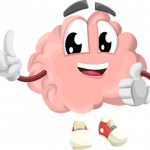The brain is a fascinating organ and we have not begun to understand the brain’s complexity. The brain is elastic, unique and remarkable.
The adult human brain has the ability to store 2.5 million gigabytes digital memory. This is a HUGE amount of data. The human brain is a very sophisticated computer.
It can be heartbreaking to see our friends as family as they age lose their ability to recall their memories. But memory loss can happen at any age. Both internal and external factors can affect our brain’s ability to recall memories.
Memory has three functions. Memory is the ability of the brain to store, maintain and retrieve information from the mind. Any impairment to one of these stages and you can have memory problems.
There are different types of memory:
Short-Term Memory – This memory is for storing temporary things you need to remember. Like why you are going to the grocery store at this particular moment (Milk for example). These memories do not need to move to long term memory once you have accomplished the task.
Sensory Register – This is the initial moment or feeling of an event. These memories will then be placed into short-term memory and stored there. Short-term memory is limited and temporary.
Long-Term Memory – This is where general and historical events are stored. Short-term memories can be turned into long-term memories. For example, you meet someone at a meeting and learn their name. Unless you continue to see this person in your social circle you may forget their name. If you work at linking this name to this person you can move it into long-term memory.
Episodic Memory – These memories contain the individual and specific events that are yours alone.
Semantic Memory or Declarative Memory – These memories contain general knowledge but may take some effort to retrieve. Such as the capital of Missouri.
Procedural Memory – This type of memory is where we learn motor skills. The human body learns to perform functions like hitting a baseball through repetition of an action.
Working Memory – This is when the mind is working on a complex problem and must switch between calculations and the area where data is stored.
As you can see, your memory is complicated.
Things that can harm your memory:
Aging – Old age is the most well-known cause of memory loss. As you age is seems that neurons have more trouble maintaining your memory. Learning and recall suffer as we age.
Head Trauma – Accidents involving head trauma play a part in immediate memory loss and future memory loss.
Heart Attacks – People who experience heart attacks often deal with memory loss function as they age.
Stroke – People who experience a stroke often have memory loss issues. Anything that interrupts the brain’s blood supply can be harmful.
Brain Tumors – Tumors is the brain even if not cancerous can impede the brain’s function and cause memory loss. Surgery can sometimes fix this issue.
Encephalitis – Encephalitis is an infection in the brain. This infection can affect the brain’s ability to work correctly and can cause memory loss.
Smoking, Alcohol and Drug Abuse – Smoking, alcoholism and drug abuse are terrible for your health in general, but they can also harm your brain health.
Habits To Protect Brain Health
There are somethings you can do to protect your brain and help keep it healthy and in good working order.
Exercise – Keeping your heart pumping well and getting blood flowing through out your body is great for your health and your brain. It is recommended that you get 30 minutes of aerobic activity at least 5 days every week.
Sleep – Adults should get between 7 to 9 hours of sleep every night.
Medications – Medications can interfere with your thinking. Be aware of all potential side effects from the medications you are taking.
Treat All Medical Problems – If you have Diabetes or High Blood Pressure get these conditions treated. Not treating them can harm your memory health.
Socialize – Get involved. Find a group of people that you can regularly meet and interact with. Having a support system of people is important for overall wellbeing.
Learn – Learning something new at every age is important for keeping our brains functioning their best. Find something you are interested in and take it to the next level. Like watching birds. Get a bird book and a pair of binoculars and start something new. It can be anything that you find interesting.
The brain regulates many bodily functions to help us survive. Our brain regulates muscle contraction, digestion, monitors our five senses, regulates breathing and heart beats and monitors our surroundings so we can function daily. We need our brains and our memories to help us navigate the world. Let’s do all we can to protect our brain health and give us the best chance of keeping our memories.
Help improve mood, memory, and cognition with Revive-It-All!
Memory loss can strike at any age. Get brain health tips here! #HealthSurgeon
Sources:
https://www.ncbi.nlm.nih.gov/books/NBK234153/
https://www.cnsnevada.com/what-is-the-memory-capacity-of-a-human-brain/
https://lesley.edu/article/stages-of-memory
https://www.hopkinsmedicine.org/health/wellness-and-prevention/memory-5-ways-to-protect-your-brain-health
https://www.smithsonianmag.com/science-nature/how-our-brains-make-memories-14466850/









